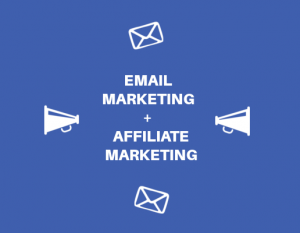In today’s fast-paced digital world, businesses and individuals are constantly exploring strategies to grow their revenue, expand their reach, and build strong connections with their audience. Two of the most effective techniques in the digital marketing space are email marketing and affiliate marketing. When combined strategically, they can form a powerful duo that delivers impressive results.

1. Understanding Email Marketing: A Direct Communication Tool
Email marketing is a digital marketing method that involves sending emails to a targeted list of subscribers. These emails are designed to inform, engage, and convert recipients through promotional content, updates, newsletters, or special offers.
Benefits of Email Marketing
- High ROI: Email marketing consistently delivers one of the highest returns on investment (ROI) among digital strategies.
- Personalization: You can tailor content to specific segments of your audience.
- Measurable Results: Email campaigns can be tracked and analyzed for open rates, click-through rates, and conversions.
- Cost-Effective: Compared to traditional advertising, email marketing is affordable and efficient.
By cultivating an email list, marketers can establish a direct line of communication with potential customers and maintain long-term relationships.
2. What is Affiliate Marketing? A Performance-Based Revenue Model
Affiliate marketing is a type of performance-based marketing in which individuals (affiliates) promote products or services from other businesses and earn a commission for each sale, lead, or action generated through their referral links.
Key Components of Affiliate Marketing
- Affiliate Links: Unique tracking links given to affiliates to promote products.
- Commission-Based Earnings: Affiliates earn money based on the number of sales or leads generated.
- Multiple Platforms: Blogs, social media, YouTube, and email lists are popular mediums for affiliate promotion.
Affiliate marketing allows individuals to monetize their content by promoting products that align with their niche and audience interests.
3. Why Email Marketing and Affiliate Marketing Work So Well Together
When used together, email marketing and affiliate marketing can create a high-converting system for passive income and audience engagement.
a. Trust and Authority
Email subscribers are often loyal readers who have opted in to receive updates. Promoting affiliate products through email feels more personal and trustworthy, especially when the products align with the audience’s interests.
b. Higher Conversion Rates
Unlike random website visitors, email subscribers are already engaged. This makes them more likely to click on affiliate links and complete purchases, increasing conversion rates.
c. Passive Income Potential
You can set up automated email sequences with embedded affiliate links that continue generating revenue long after being sent. This turns your email list into a passive income stream.
4. How to Start Using Email Marketing for Affiliate Promotion
If you’re looking to integrate email marketing and affiliate marketing, here’s how you can start:
a. Build an Engaged Email List
Use lead magnets like ebooks, checklists, or webinars to attract subscribers. Make sure your signup forms are clear, attractive, and placed strategically on your website or social media pages.
b. Choose Relevant Affiliate Products
Only promote products you believe in and that your audience will find useful. Irrelevant or poor-quality products can harm your reputation and lead to unsubscribes.
c. Create Valuable Email Content
Focus on delivering value first. Educational content, product comparisons, honest reviews, and exclusive deals help build trust and make your affiliate promotions feel natural.
d. Use Strong Calls to Action (CTAs)
Include clear and compelling CTAs that guide readers to click your affiliate links. Use phrases like “Get 10% off here” or “Check out this product I personally use.”
5. Best Practices for Email Marketing and Affiliate Marketing Success
To make the most out of your combined strategy, keep these best practices in mind:
a. Segment Your Email List
Group subscribers based on interests, behavior, or purchase history. This allows you to send highly targeted affiliate promotions that are more likely to convert.
b. Be Transparent
Always disclose your affiliate relationships. Let your readers know that you may earn a commission if they purchase through your link. Transparency builds trust and aligns with legal requirements.
c. Track Performance
Use email marketing platforms like Mailchimp, ConvertKit, or GetResponse to track open rates, click-through rates, and conversion metrics. Monitor which affiliate campaigns perform best and optimize future emails accordingly.
d. Stay Consistent but Not Spammy
Send emails consistently—whether it’s weekly, biweekly, or monthly. However, avoid bombarding your audience with constant promotions. Balance affiliate content with educational or entertaining emails.
6. Common Mistakes to Avoid in Email Affiliate Marketing
While email marketing and affiliate marketing are powerful together, some common pitfalls can hinder success.
a. Overloading with Promotions
Constantly pushing products can lead to email fatigue and unsubscribes. Mix in non-promotional content to keep subscribers engaged.
b. Ignoring Mobile Optimization
Many users check emails on their phones. Ensure your emails are mobile-friendly with responsive design and easily clickable links.
c. Skipping Legal Compliance
Follow GDPR, CAN-SPAM, and affiliate program guidelines. Always include an unsubscribe link and avoid misleading subject lines.
Conclusion: Unlocking the Power of Email Marketing and Affiliate Marketing
Combining email marketing and affiliate marketing creates an incredibly effective strategy for digital marketers, content creators, and entrepreneurs. By nurturing an engaged audience through email and offering relevant affiliate products, you can build trust, provide value, and generate consistent revenue.
Whether you’re just starting out or looking to grow your income streams, mastering both email marketing and affiliate marketing can set you on the path to long-term online success.
